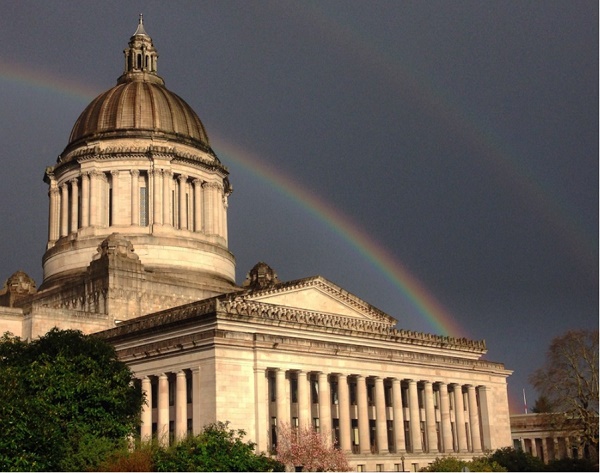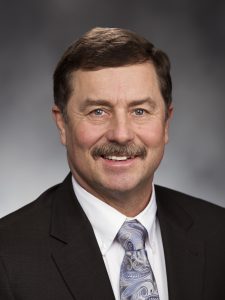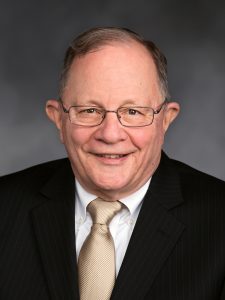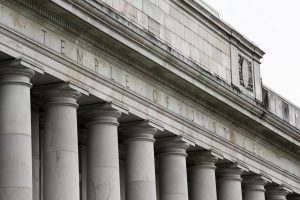 In 2017, the top issue is the budget and the hot topic is education. But not all is what it seems. Both parties acknowledge the importance of fully funding basic education and the need to establish a better system to distribute money to local school districts. The real debate is whether a massive tax increase is needed to accomplish these goals.
In 2017, the top issue is the budget and the hot topic is education. But not all is what it seems. Both parties acknowledge the importance of fully funding basic education and the need to establish a better system to distribute money to local school districts. The real debate is whether a massive tax increase is needed to accomplish these goals.
Since the Majority Coalition Caucus won control of the Senate in 2013, the Legislature has increased the budget for K-12 education by $4.6 billion — without a general tax increase. No magic was involved. Virtually every year the state’s tax system delivers more money than the last, without a tax increase, due to growth in the economy. By allocating most of this new money to education, the Senate has succeeded in restoring education’s share of the budget to its highest level in the last 30 years. By continuing this policy, by maintaining sizeable reserves, and by reorganizing the system in an intelligent way, the Legislature can raise the money to finish the job.
On this page you will find postings describing the issues involved and the real motivations behind the debate — most importantly, the push for a statewide income tax.
h
Sen. Mark Schoesler: Income tax is the real issue, not schools
This op-ed originally appeared in The (Spokane) Spokesman-Review, Jan. 8, 2017.
Some folks want the people of Washington to think the big issue in our upcoming legislative session is public education. They say it’s all about the children, the schools and the state Supreme Court’s demand that the state spend more for basic education. They insist the only solution is a massive tax increase – like the enormous $8.7 billion proposal the governor laid out last month.
But after you serve in the Legislature a few years, you learn that when people say something is about the children, it’s always about something else. The real debate for 2017 isn’t about the schools – it’s about an income tax.
This is the cleverest campaign for an income tax ever mounted in this state. Advocates for bigger government have created the illusion of a crisis in the public schools that only mountains of money can fix. Through a lawsuit they’ve gotten the state Supreme Court on their side. They would force taxes that dig deeper into everyone’s pockets, slam the brakes on economic growth, and redistribute more of the people’s hard-earned income to state agencies and powerful special-interest groups. Ultimately the goal is an income tax. Yet supporters are bending over backward to avoid using that term – and who can blame them?
Voters have told us time and again they don’t want an income tax – nine times since 1934, most recently in 2010, when they rejected a “high-earners” plan that was only supposed to hurt the rich. Most people recognized it for what it was: an income tax that would quickly be extended to every Washingtonian, the next time the economy has a hiccup.
The objective behind these proposals is always the same. Not “stability,” as Gov. Booth Gardner argued in the ’80s, or “fairness,” as left-wing think tanks and their allies tell us today. It is to raise more money, so the Legislature won’t have to tell anyone no, and lawmakers won’t need to establish hard-nosed priorities as they should whenever they write a budget.
Only one thing is different this time. These groups – the public-employee unions, the teachers’ union, the social-service lobby and others – have finally learned from their mistakes. Instead of telling people higher taxes are good for them, which never works, they are identifying a need. Everyone agrees public schools ought to be our top priority. Even our state constitution says so.
So a few years ago, many of these interests got behind the so-called McCleary lawsuit, claiming the state isn’t spending enough on public schools. They had a point. Over the last 30 years, these same groups had battled for a bigger share of the state budget, and this caused education’s share to shrink. Naturally they figured a tax increase was the only answer.
And of course it wasn’t. Our fiscally responsible Majority Coalition Caucus took control of the Senate in 2013. We had no trouble at all ramping up school spending without raising taxes.
We were able to do it because tax collections have increased every year, thanks to growth in our state economy. All we had to do was give schools most of that new money. Since 2013 we have increased the schools’ budget a whopping $4.6 billion. We still have a complicated school-funding problem – some districts get more money than others. We can solve it by continuing to budget intelligently, maintaining healthy reserves, and reorganizing the system in a sensible way. It really is that simple.
The pro-tax crowd is horrified. It wasn’t supposed to work this way. Every time we avoid raising taxes, the Supreme Court makes new demands. The governor wants the biggest tax increase in state history. The teachers’ union is threatening strikes. Some tax advocates are even working to overturn the 1933 Supreme Court ruling that requires a public vote on a constitutional amendment before a graduated income tax can be imposed.
The most troubling thing about this effort is that advocates aren’t being honest. Ahead of the 2016 election, many candidates for the Legislature evaded questions about the income tax by saying they favor “progressive funding strategies” or “the people aren’t ready for it.” Yet their favorite proposal – an income tax on capital gains – would almost certainly lead to a general income tax, for the same reasons as the proposal voters rightly rejected in 2010.
My biggest wish for the 2017 session is that we debate the income tax openly and honestly, so the people understand what is really at stake. Once that happens I don’t think it stands a chance.
Sen. Mark Schoesler, R-Ritzville, is leader of the Senate Majority Coalition Caucus.
An out-of-bounds court casts shadow over Legislature
By Sen. Mike Padden, R-Spokane Valley
Note: This op-ed originally appeared in the Valley News Herald, Spokane Valley, Jan. 13, 2017.
In Olympia this year we’re going to be talking about a number of specific issues that have a direct impact on the people of the Spokane Valley and Washington as a whole – water rights for the Valley’s fast-growing communities, property crime, and the scourge of impaired driving on our public roads. But the biggest issue we legislators face is so large it can be difficult to grasp — a threat to our system of government that has come from the state Supreme Court.
In a series of recent decisions, the state Supreme Court has asserted the ability to dictate matters of policy to the people of this state and the lawmakers who represent them. Its greatest challenge to the Legislature comes to a head this year, as we lawmakers struggle with the court’s demand that we overhaul the system by which tax money is distributed to local school districts.
At this point it is unclear how the Legislature will react. We all agree that the public schools ought to be the state’s top priority, and in fact, the Legislature has made great progress. But by attempting to micromanage legislative decisions, the court undermines the foundation of our form of government, the separation of powers.
This isn’t just a dry matter of constitutional law. Over the last 80 years this state has seen has seen considerable political agitation for an income tax. This effort comes from those with the most to gain – the unions representing state employees and teachers, social-service advocates and others. But every time an income tax has been put to the people since 1934, they have said no, in the loudest possible terms. The Supreme Court’s intrusion into the school-funding debate appears part of a well-calculated strategy to back the state into a corner and force it to adopt an income tax, whether it wants one or not.
Five years ago, the court sided with many of these interest groups on a lawsuit alleging the state wasn’t spending enough on basic education. True enough. Over 30 years, the Legislature allowed education’s share of the state budget to shrink as louder, more persistent interest groups demanded a greater share.
But the court’s ruling in McCleary v. Washington came just as our fiscally-responsible Majority Coalition Caucus took control of the Senate. Many assumed a tax increase was the only solution. We proved otherwise. Tax collections rise virtually every year, without a tax increase, because of growth in the state economy. We put most of that new money into the schools, increasing the schools budget by $4.6 billion since 2013. By continuing this policy, by maintaining strong reserves, and by reorganizing our system in a sensible way, we can address the problems that remain.
Unfortunately the court fails to recognize that the Legislature is a co-equal branch of government that speaks directly for the people, and ought to be left to decide matters for itself. It decided to “retain jurisdiction.” This has allowed it to issue rulings, year after year, chiding us for “failing to do the job,” while ignoring what has been done. In 2015, it even found the Legislature in “contempt” – a citation that leaves us puzzled, because it implies the court believes it has greater authority than the legislative branch. The constitution makes us equals.
Whenever the Legislature manages to avoid raising taxes, the court moves the goalposts, and imposes new and costly requirements – as if to create a situation only a massive tax increase can resolve. And worse – the court appears to buy the argument that money by itself means quality, something we in the Legislature understand is far from true.
This isn’t the only case in which the court has presumed to dictate legislative policy. In 2015, it overturned the state’s charter-school law, a top priority for the teachers’ union. Its convoluted decision appeared to copy and paste from the union’s briefs. Another questionable decision overturned the state’s two-thirds-for-taxes law, which ensured any tax increase is approved by two-thirds of the Legislature — an important protection approved by the state’s voters six times. Last fall, the court essentially junked state law permitting small family wells, creating new burdens for private property owners seeking to develop their land.
We must remember that neither the state nor federal constitutions give the courts supremacy over the elected representatives of the people. Nowhere are the courts given the explicit right to overturn legislation as unconstitutional. Instead this practice is a matter of 200 years of legal tradition, accepted by the legislative branch as a matter of respect for the courts. There is no telling where this conflict will end, but by intervening in what is properly a political debate, the court demonstrates disrespect for the legislative branch, and weakens the bonds that allow our system of government to function.
Sen. Mike Padden represents Spokane County’s 4th Legislative District.
The monster lurking behind school funding: an income tax
by Sen. Tim Sheldon, D-Potlatch
Note: This op-ed originally appeared in Crosscut, Jan. 20, 2017
In this great state of ours, where so many people have so many diverse interests, there is one thing we can count on to unite us all. Every few years, some dang fool puts an income tax on the ballot, and then the rest of us get together and stomp it to death.
The last time we did it, we also pounded a stake through its heart — 64 percent of us voted no.
But that was seven years ago, and the horror never really goes away. The monster just won’t stay dead. With the 2017 session of the Legislature underway, we already can hear it crashing through the underbrush in the direction of the state Capitol. This year, the income tax is dressed up as a school-funding issue. A darned good disguise, more cunning than ever, and I’m getting worried the good people of Washington won’t see through it until too late.
Advocates of a state income tax have finally realized they will never win if they put the question to the people in an honest way. So they have set up the phoniest debate since America was forced to choose between “tastes great” and “less filling.” If you listen to the proponents, our big argument for 2017 is about levy equalization and model-school formulas — magic words that have the effect of putting an entire state to sleep. But really it is the same old argument we’ve been having in Washington more than 80 years.
Our big debate isn’t about education. It’s about the income tax.
The story is a thousand times simpler than some people want you to think. Some interests in this state are obsessed with raising taxes. If only we had more money, we could spend it all on them. Over the years they have assembled quite a coalition. It includes the public-employee unions, the teachers’ union, the social-service lobby and many others. For these groups the income tax is the Holy Grail, because it would raise gobs of money and it’s the one big tax Washington doesn’t have. Just one problem. The people keep getting in the way.
Way back in 1933, the state Supreme Court decided there had to be a public vote on a constitutional amendment before the state could impose a graduated income tax. Every time the issue has appeared on ballot since then, the people have had the good sense to say no. That’s nine times so far. It doesn’t matter how many blue-ribbon commissions and tax studies have tried to convince the public that higher taxes are good for them. The tax crowd has tried pretty much everything. One time they tried disguising the income tax as an old-age pension. Last time it was an income tax that was only supposed to hurt the rich. The people are just too smart for that.
So 10 years ago, the coalition tried a new approach – a lawsuit alleging the state doesn’t spend enough money on basic education. Keep in mind, the special interests were basically right about that. The way each of them had tugged and strained for a bigger share of the state budget over the last 30 years, they had distorted the state’s priorities and caused education’s share to shrink. The state Supreme Court took their side, and its 2012 ruling in McCleary v. Washington forced some serious thinking at the statehouse.
Most people seemed to think the only way to raise billions and billions of dollars was a tax increase. But this was right about the time the fiscally-responsible Majority Coalition Caucus, of which I am a part, took over in the Senate. We knew better. Virtually every year, the state collects more tax money than the last, without a tax increase, thanks to growth in the state economy. We plowed more than two-thirds of that money into education. The biennial public-schools budget has increased $4.6 billion since 2013. Education now gets 47.3 percent of state spending, its biggest share in 30 years. We still have work to do, but we can finish the job by continuing to budget responsibly, maintaining healthy reserves against downturns, and enacting sensible reforms to the way we distribute money to school districts.
So what’s the problem? There really isn’t one — I guess that’s the problem. The state Supreme Court keeps hollering that we aren’t doing our job, for reasons that are hard to understand. It keeps finding new things we ought to pay for, to make the price tag higher, and it wants us to do everything this year. The governor is proposing the biggest tax increase in state history, $8.7 billion when fully implemented, to pay for everything anyone has ever asked for, and calling it an emergency. Things must not have worked the way they were supposed to.
The favorite proposal of the tax coalition is an income tax on capital gains. The idea is pretty similar to the high-earners income tax we all got together and killed seven years ago. It hits the same people, and it has the same big problem. The moment the economy takes a dive — something that happens every few years — tax collections will plummet and the state will be backed into a corner, forced to raise hundreds of millions of dollars in a hurry. That’s what happened across the country last time a recession hit, in states that tax capital gains income. In Washington, the easiest way out would become a general income tax that hits every taxpayer in the state.
That 1933 Supreme Court ruling requiring a public vote isn’t much protection, either. The tax crowd is convinced the court will overturn the decision the next chance it gets, and the way the court has been playing politics lately, that seems a pretty good bet. If the Legislature passes a capital gains tax, that test case will finally be here. The public vote will be the first thing to go.
The whole thing is so clear to everyone in Olympia, it is dismaying that it is so fuzzy to everyone else. Newspaper editorials thunder that the Legislature has shirked its duty to education and don’t let facts get in the way. Members of my own party evade questions about the income tax, with vague statements about “progressive funding strategies,” “tax fairness” and “tax reform.” The voters let them get away with it. I get the feeling that so many people have gotten caught up in the details they have trouble understanding what the argument is really about.
Reminds me a little of those old black-and-white horror movies. There’s always someone who shouts, “Don’t worry about the monster — it won’t hurt you!” But the villagers always know better. The sooner the people of Washington hear an honest debate, the sooner understanding will dawn. I just hope it happens in time for everyone to get out their torches and pitchforks.
State Sen. Tim Sheldon represents the 35th Legislative District.









